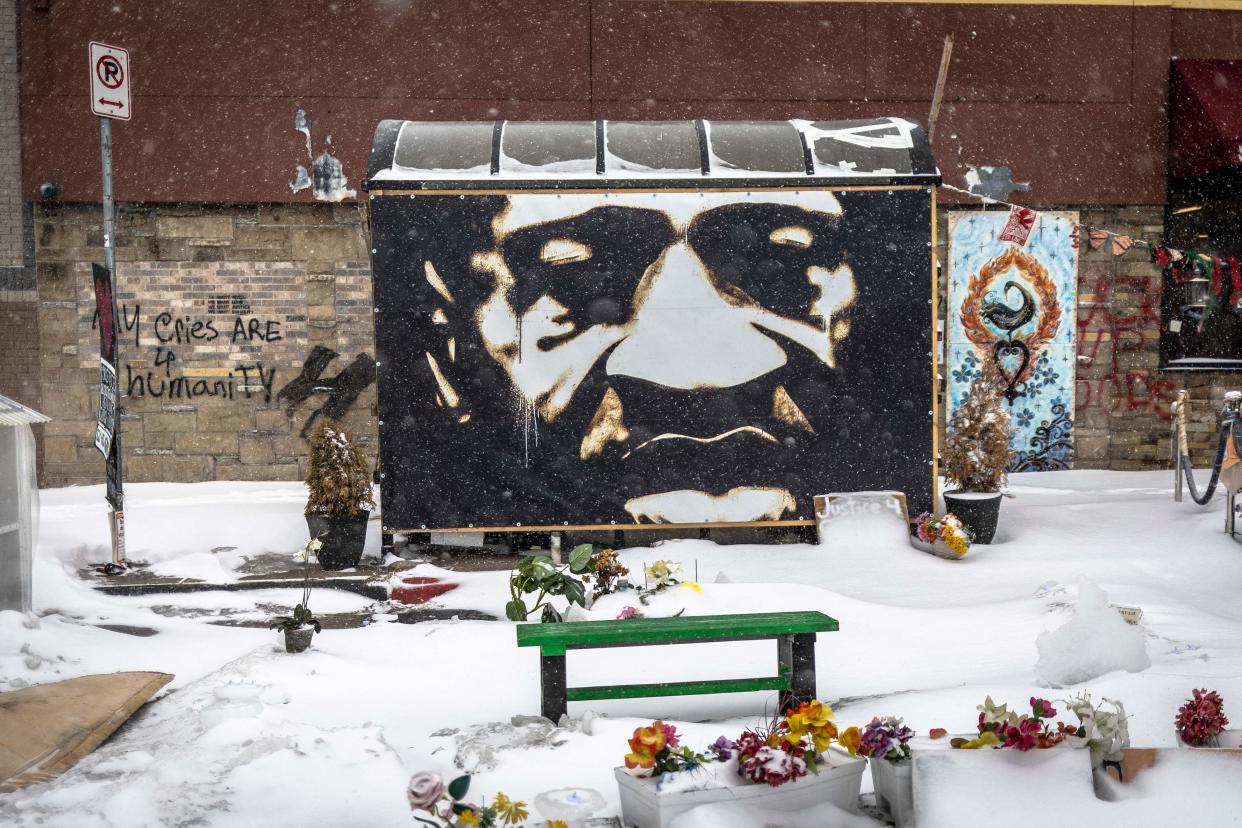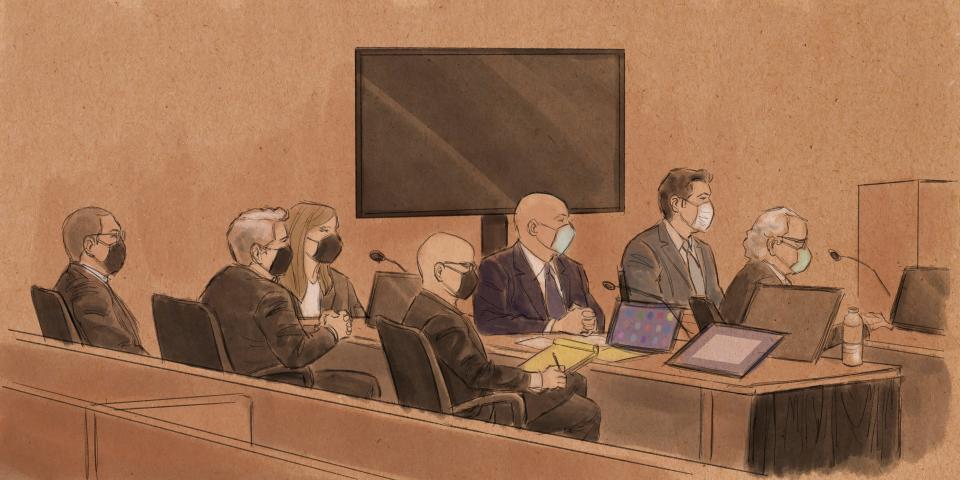Ex-cop: Verdict in Floyd case, others show cracks in blue wall. Here's what has to change.

- Oops!Something went wrong.Please try again later.
On Thursday, a federal jury convicted three former Minneapolis police officers for willfully depriving George Floyd of his civil right to medical care. Two of the officers were also found guilty of failing to intervene as officer Derek Chauvin suffocated Floyd.
This latest indictment is one of several high-profile judgments against police officers since Chauvin’s murder sentencing last year. Just over a week ago, another former Minneapolis officer, Kim Potter, received a two-year prison sentence for mistakenly drawing her gun instead of a Taser in the fatal traffic-stop shooting of Daunte Wright. That same week, a Texas jury indicted 19 Austin police officers for aggravated assault against demonstrators during the 2020 protests over Floyd's killing.
Unlike these cases, the convicted Minneapolis cops were not punished for what they did but instead for what they failed to do. A federal jury found them guilty because none of these officers actively intervened as Floyd pleaded for his life while under Chauvin’s knee.
Chauvin and backup officers
Indeed, it is often unclear to backup officers how to fight back against excessive force or what would be objectively reasonable to do based on the information at hand. As with Chauvin and the officers assisting him, the power imbalance between a supervisor (Chauvin was the ranking officer) and their subordinates makes intervening tricky for junior officers.
COLUMN: 'Crack pipe' rhetoric is not only wrong, it's deadly. Harm reduction efforts save lives.

Despite this, officers swear an oath to protect citizens, even if that means defending them from their own.
Recent indictments, the willingness of officers and public officials to testify and the guilty verdicts that have followed show that the blue wall of silence – which has protected cops from conviction for so long – is beginning to crack.
If the justice system gets tougher on police killings, misconduct and excessive force, police departments may finally be incentivized to clean up core issues. Rather than merely seeking increased officer accountability, the goal must be to prevent tragedies in the first place.
COLUMN: I was incarcerated under failed law. Now I push for consequences for bad prosecutors.
Accountability from the top down
Officers undoubtedly are responsible for their actions. But terminating and locking up abusive or incompetent officers one at a time does not hold chief culprits accountable. It's a necessary, but very inefficient, means of improving police conduct.
For too long, police leaders and local government officials have gotten off relatively easy while eyes shift solely to officers in terms of blame. Not only did Minneapolis officials let down Floyd, his family and the entire city, they also failed officers by not providing sufficient duty-to-intervene training or holding Chauvin (and other officers in charge of training) accountable for past misconduct. Minneapolis officers who beat a drunk resident, leaving behind a pool of blood, were given essentially a slap on the wrist, and then put in charge of training, according to a report. When behavior at the top changes, officers will be forced to fall in line.
Police also need help sorting through mental health issues that might cause them to lack the capacity to de-escalate or make good decisions in situations where excessive force is being used.
Agencies should invest in trauma-informed police wellness approaches that help reduce officer stress and depression. Officers are exposed to personal and vicarious trauma almost daily. And if left unaddressed, the risk of officers engaging in violence at work and at home increases significantly.
One related study suggests poor mental health among officers could contribute to misconduct, and post-traumatic stress potentially accounts for up to almost half of excessive force cases.
COLUMN: Truck driver sentenced to 110 years shows hazards of prosecutors manipulating trial system
With suicide rates among officers much higher than the general population’s, our officers clearly need additional support. Several mindfulness and self-regulation interventions have shown promise in reducing stress and depression and improving coping abilities.
End minor traffic stops, engage in community
Police departments should also pull back from enforcing lesser crimes, including minor traffic infractions, especially when enforcement has minimal public safety impact. Fatal police shootings and citizen resistance often occur during police stops or escalations that start during other minor encounters. From Philando Castile to Eric Garner to Floyd to Sandra Bland, encounters for relatively trivial incidents preceded their deaths. By overemphasizing traditional enforcement activities, police managers and civic leaders unnecessarily place officers and citizens in adversarial and often emotionally charged situations.
Evidence from cities such as Cincinnati and Fayetteville, North Carolina, suggest that police can help improve crime rates and citizen attitudes toward officers, reduce racial disparity in stops and searches, and curb police-citizen violence by redirecting time and resources toward more serious offenses.
Police departments should reward and incentivize officers to engage in community and problem-oriented activities. Despite decades-old rhetoric surrounding community policing, agencies continue to stress traditional enforcement metrics in officer performance evaluations, including the number of stops, searches and arrests.
COLUMN: On death row for 30 years, his execution was the epitome of cruel and unusual
Police officers devote much of their time to noncriminal calls. Incentive structures should be realigned to promote innovative and community-centered practices. Doing that could mean fewer opportunities for police-citizen violence and open new leadership pathways for officers subscribing to guardian-style policing.
The recent focus on police accountability – as seen in guilty verdicts and indictments for officers – is encouraging but far from a watershed social justice moment. It's a beginning. Let's push police forces to work harder and more creatively to change practices and policies at the heart of misconduct.
If departments don't, we'll surely see more moments of misconduct and abuse caught on video and, justifiably, more guilty verdicts in response. When it comes to officer misconduct, the justice system appears to be evolving. But that's not enough.
Thaddeus L. Johnson, a former police officer, is a senior fellow at the Council on Criminal Justice and teaches criminology at Georgia State University. His wife, Natasha N. Johnson, is a faculty member at Georgia State and director of the university’s master's program in criminal justice administration.
You can read diverse opinions from our Board of Contributors and other writers on the Opinion front page, on Twitter @usatodayopinion and in our daily Opinion newsletter. To respond to a column, submit a comment to letters@usatoday.com.
This article originally appeared on USA TODAY: Ex-cop: Recent verdict in Floyd case shows cracks in blue wall

